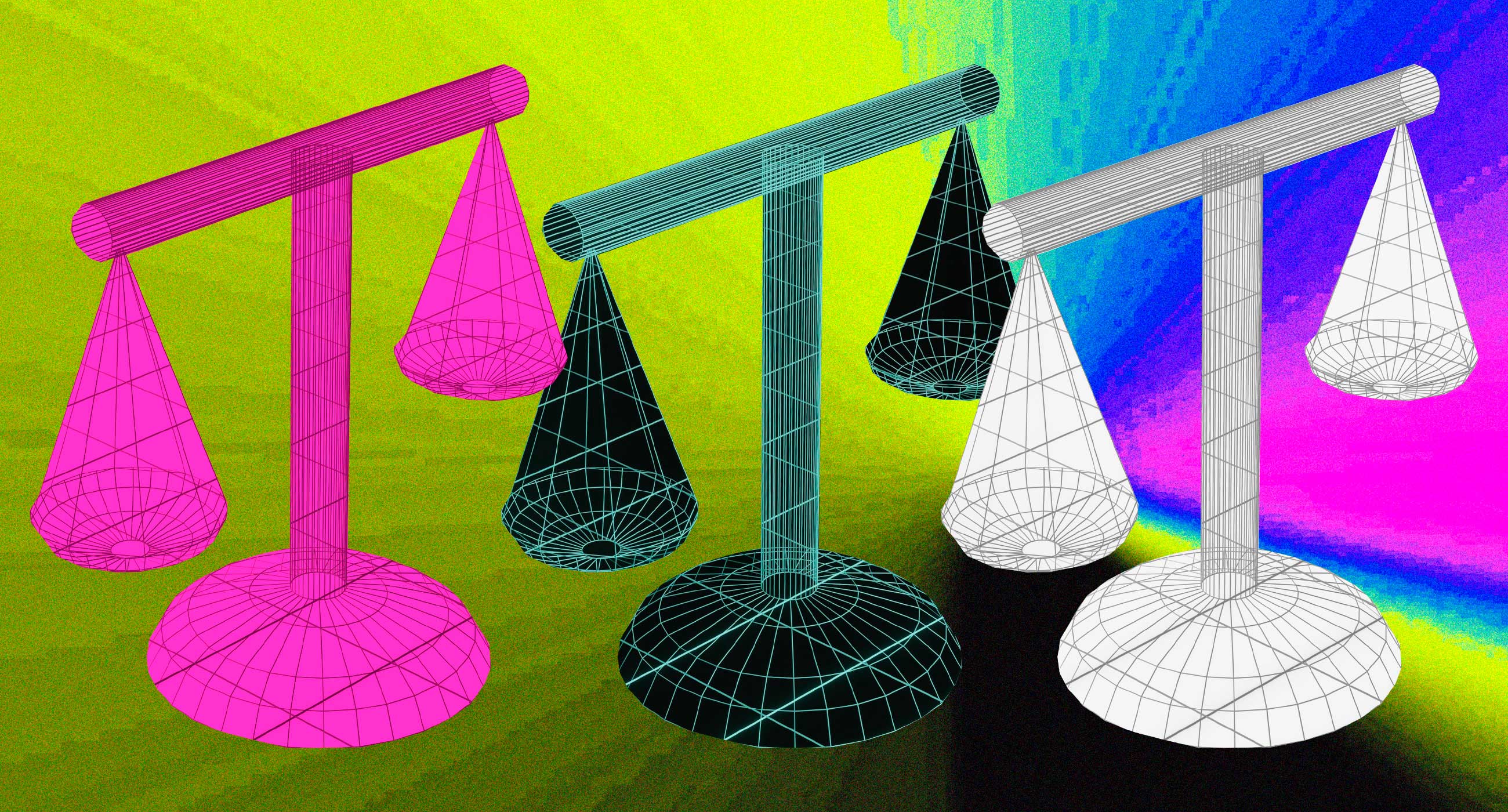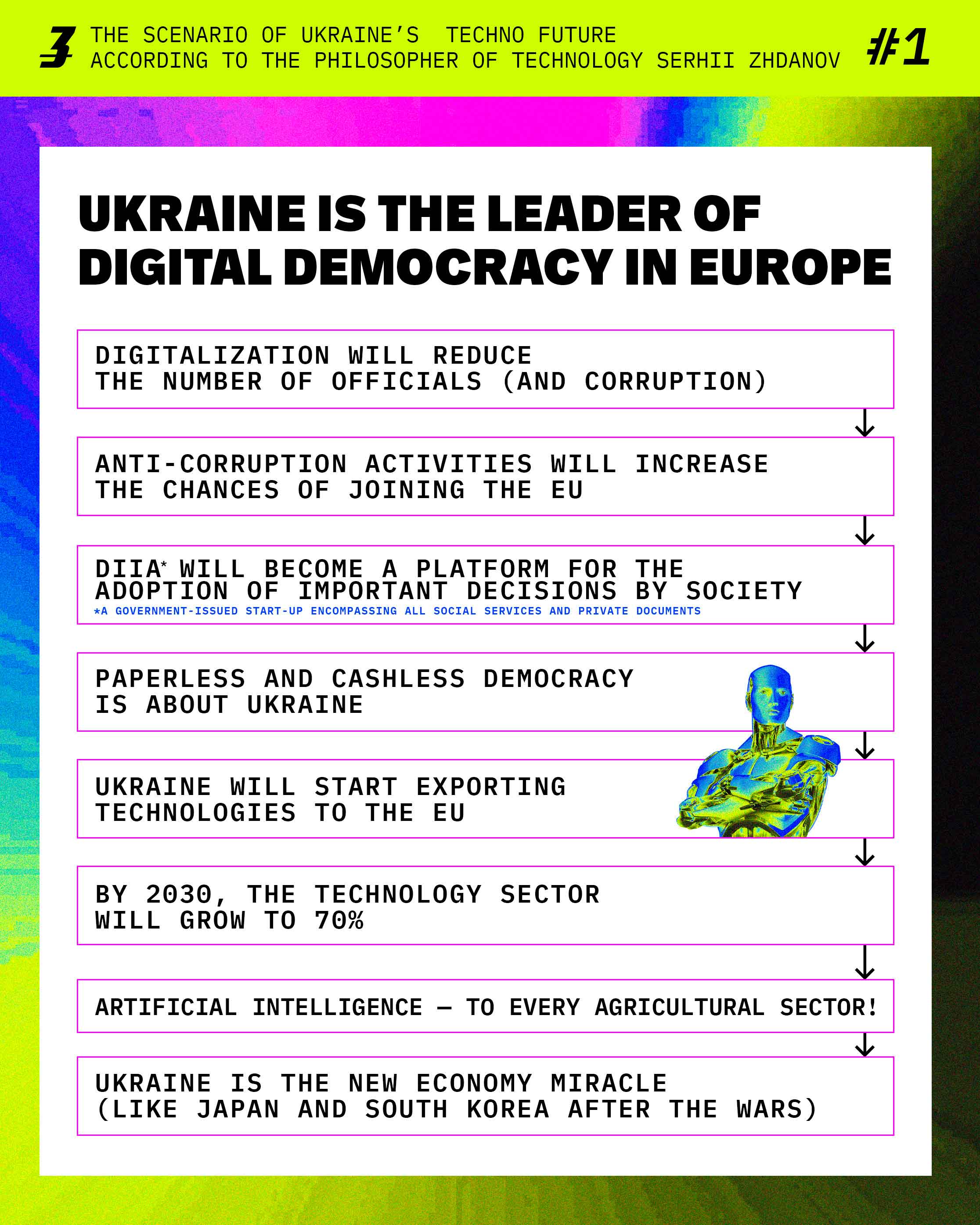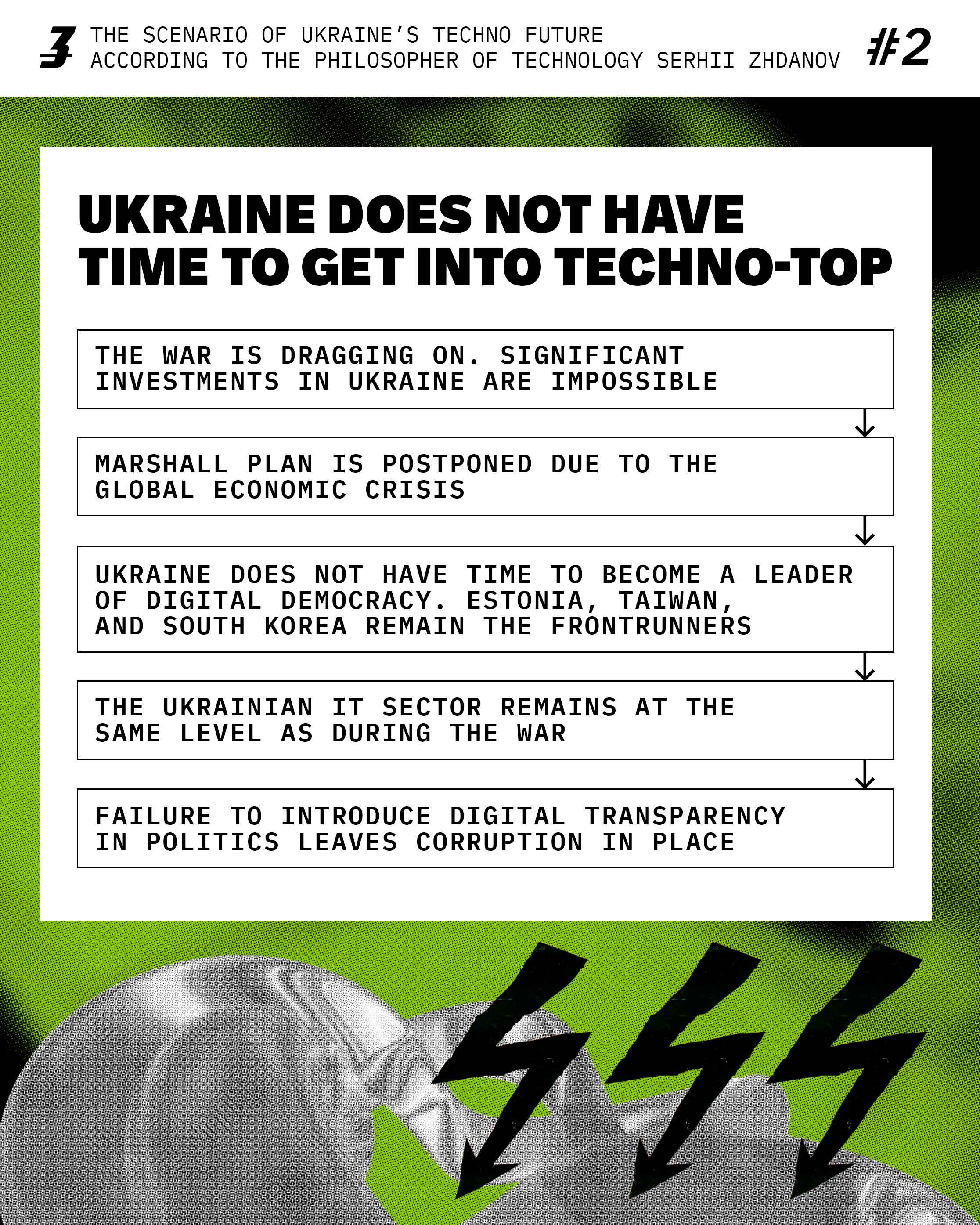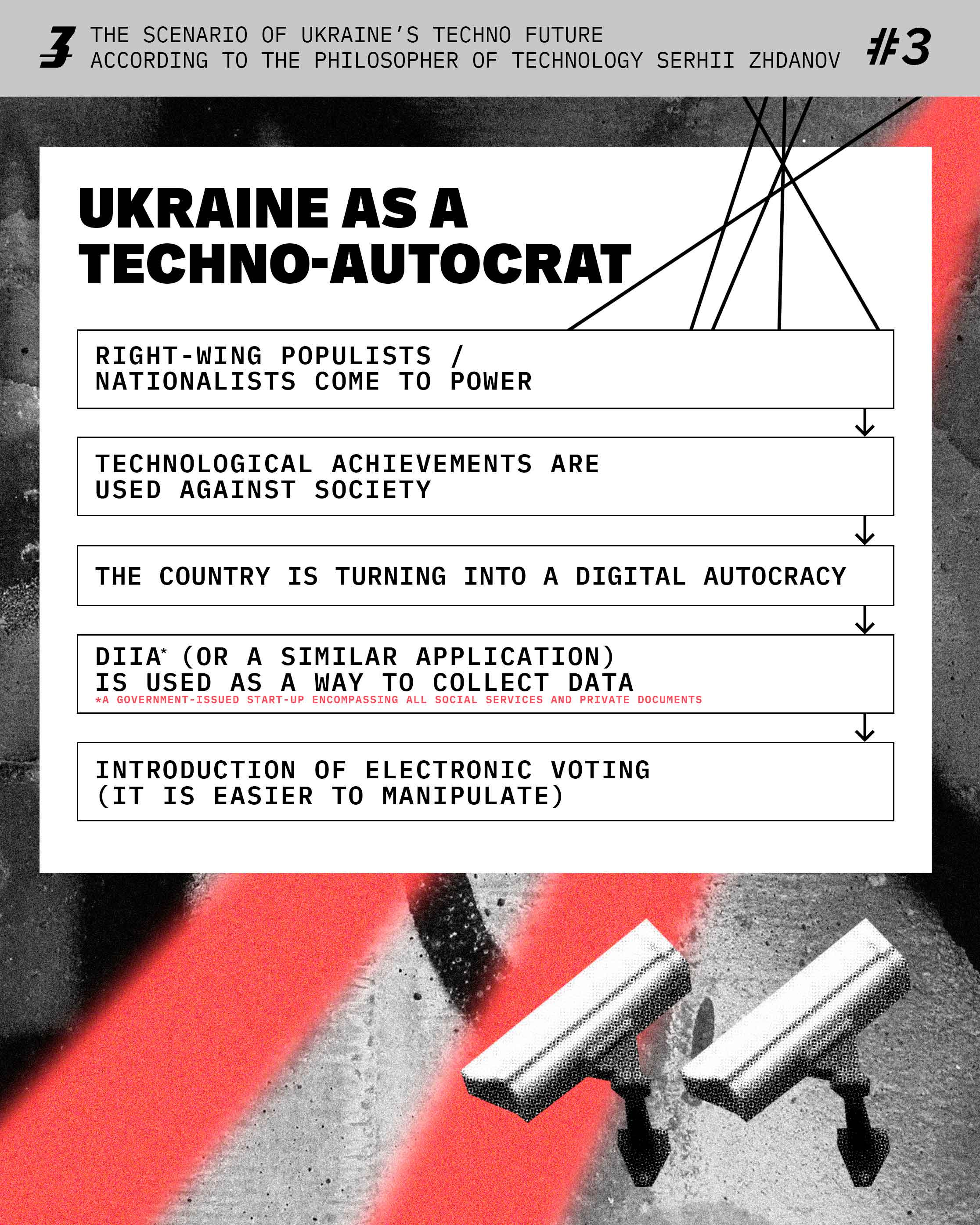On August 24, Zaborona announced a “Contours of the future” series of materials, where experts — from historians and public intellectuals to economists and sociologists — will try to predict the development of the situation in Ukraine. We asked the philosopher and ethicist of technology Serhii Zhdanov to predict what technological development in Ukraine will look like in 5-7 years. He wrote three possible options — good (Ukraine as a country-start-up), bad (related to the economic crisis), and very bad (similar to China’s technopolitics).
Approximately 40% of Ukrainians are digital citizens who actively use the Diia state application. Already today, Ukraine is placed in the same row as Estonia and South Korea — the most effective digital democracies in the world, in which technocrats work on the transparency of political activity and the improvement of state services with the help of technology.
War or its aftermath becomes a catalyst and accelerator of development—especially when the Marshall Plan and investment in the affected country’s economy are at work. We can recall post-war Japan, which in the 60s became the second economy in the world after the “gentle occupation” of the USA. But Ukraine does not have to wait for the end of the war: the country is being invested in right now, and the Ministry of Digital Transformation is already participating in Elon Musk’s projects and follows the methodology of working with American high technologies.
At the same time, technology is a neutral invention that can be used by both democratic and personalistic or authoritarian systems. Will the technological boom necessarily lead to even greater democratization in Ukraine, as it was in Taiwan? Or does it seem possible that after the victory, right-wing populist or nationalist forces will come to power and use Ukraine’s technological assets to consolidate their influence on society?
So, what can Ukraine be like in 5-7 years?
Scenario 1: techno-optimistic
Paperless digital democracy
Methodologies for creating digital democracy in Europe appeared in 2009. In Ukraine, the Concept of the Development of Electronic Democracy was approved in 2017, and in 2019, the Ministry of Digital Transformation appeared, which at the beginning of this year digitized many state services. However, it was only during the full-scale invasion of Russia that digitalization turned out not only to be a promising concept, but also a vital practice for Ukraine.
The digitalization of the state is the automation of the work that people once did. A person, as you know, is imperfect: he procrastinates and takes bribes — and all for taxpayers’ money. Digitization will reduce the number of officials in the state and budget spending on inefficient salaries, reduce the frequency of interaction with living people (and therefore corruption), force government officials to be more transparent, and ultimately increase society’s control over the people who are supposed to represent its interests.
During the war, the number of users of the Diia state application increased: 40% of Ukrainians are digital citizens. When a majority joins this hub, the program will transform into a decision-making tool by direct electronic voting. Successful surveys on the conditions for legalizing the carrying of weapons or redesigning the coat of arms on the shield of the Motherland monument were test runs. The government can start polling about Soviet and future monuments, postage stamps, and street names by turning to digital civil society: everyone over morning coffee with a smartphone in hand will determine which business to direct taxes to and which countries to sign economic cooperation with.
Digital integration in the EU
The war made Ukrainian digitization experts valuable consultants for European countries, and in the future, Ukraine may become a leader in digitalization in Eastern Europe. We have already overtaken one of the most effective digital democracies in Europe, our “teacher” — Estonia: the Baltic country recently started exporting technologies from Ukraine to create a local analog of Diia. In the future, other democracies can benefit from the experience of resisting the pressure of authoritarian military threats. And while we are waiting for the European Union’s decision regarding legal and economic integration, this integration is already taking place in the field of digitalization. Soon, European digital solutions for organization, security, and data storage will be in a single ecosystem, of which Ukraine has already become a part.
Another interesting nuance is that the main requirements of the EU for Ukraine’s status in the Union are reducing corruption and digital reform. Both tasks will be solved by the Ministry of Digital Transformation. Corruption, as already mentioned, will decrease thanks to the reduction of officials and the digitalization of services. Ukraine will become not only paperless (all documents would be on a smartphone), but also cashless (only electronic money will be used, which means that it will be impossible to “inconspicuously give money”). Given that we already rank third in the world for cryptocurrency usage after Vietnam and the Philippines, transparency in monetary transactions is closer than you might think.
Court infrastructure can also be rebuilt through technology. Instead of arguments about who to appoint as judges and monitors, the decision will come from the side of technology: most of the positions will be filled by neural networks. At the economic forum in Davos, Mykhailo Fedorov said that the Ministry of Digital Transformation is already working on a project to introduce artificial intelligence (AI) into the judicial system. AI will combine the ethical imperatives and moral value systems inherent in humanity according to the data of thousands of court cases that it will study.
Startup nation, the nation of startups
From 2018 to 2021, the Ukrainian IT industry has more than doubled and accelerated during the war. In the first quarter of 2022, Ukrainian IT workers earned a record $2 billion, almost 80% of IT enterprises attracted new customers, and in the first 4 months of the war, Ukrainians registered up to 60,000 new enterprises.
The goal of the Ministry of Digital Transformation by 2030 is to increase the share of the high-tech sector in Ukraine’s GDP to 70%. This is a very real prospect, and it fits into the global concept of the Fourth Industrial Revolution — total robotization and automation of production. We will build new enterprises and restore old ones already with the most advanced technologies, so the military-industrial, agricultural, energy, and, of course, IT sectors will emerge from the ruins of war renewed.
Paperless and cashless regimes, from the point of view of the economy, will maximally simplify the activities of entrepreneurs and the taxation process, removing businesses from the gray tax zone. In a digitalized democracy, the state will turn into an application, and taxes into a reasonable fee for the convenient use of services.
Digitization will increase the involvement of citizens in public affairs and stimulate them to start their own businesses because the state will no longer be a pile of checks, papers, and bribes, which overshadowed the life of any Ukrainian businessman. The Ministry of Economy believes that over the next decade, a million new businessmen should appear in Ukraine, and entrepreneurship can become our new national idea.
Even now, during the war, the world techno-business perceives Ukraine as one giant startup. Advanced tech corporations have already invested in the “Ukraine” project: Microsoft, Amazon, Tesla, SpaceX, Alphabet, Binance — this list is replenished with new names. Even under the threat of Russian cruise missiles, leading businessmen of the tech world personally visited Kyiv: from Alex Karp (CEO of the most mysterious AI company Palantir) to Ethereum crypto guru Vitalik Buterin. And recently, the former CEO of Google Eric Schmidt flew to Kyiv (after creating one of the most successful businesses in history, he has been consulting the American government and the American military for years on digitalization and the implementation of AI). Representatives of the techno industry are distinguished by rationality and prudence: none of them would have risked their lives by coming to Kyiv if they did not believe that Ukraine is a profitable enterprise that you need to join in the early stages and be among the first partners.
Ukraine will continue to integrate into the digital space of the world’s leading tech corporations, and Ukrainian military-tech startups will occupy a special place in it. Our experts are already testing innovative military technologies (from drones to satellites) of Western colleagues on the battlefield and helping manufacturers to improve them — this is important, because weapons manufacturers tested inventions in simulated field conditions, but did not have the opportunity to see their effectiveness during wartime. This task is performed by Ukraine. After the end of the war, thousands of military technology specialists will work in Ukraine, and they will be able to find work in both Ukrainian and foreign military-tech startups.
Artificial intelligence in the whole country
The main trend of the global high-tech economy and a game-changer for the coming decade is artificial intelligence. By 2030, AI is expected to increase the world economy by $15 trillion (this is the GDP of China and Japan combined). Ukrainian AI companies will be able to capture part of this neural network pie. Already now, Ukraine is one of the leaders in Europe in terms of the degree of implementation of AI in the corporate sector, and the digital heart of our country, Diia, is fully automated and uses AI.
AI is software technology. Its development requires a modest material base: experts in the field of AI emphasize that fundamental breakthroughs in the field of neural networks will be made even by individuals on their home computers. Ukrainian companies will not have to look for large investments in the early stages, it will be enough to have a small team of engineers and programmers for whom the government will create comfortable working and living conditions.
Ukraine already cooperates with Elon Musk and participates in projects in the fields of green energy (Tesla solar batteries) and communications (Starlink internet satellites). Satellite Internet will make it possible to digitalize the Ukrainian village: a neural network to combat Colorado potato beetles can be added to the house and cherry orchard. The digitization of the village will be picked up by urban startups with applications that will help the villagers sell their products to the townspeople.
Economy of talents
People are the most valuable resource: it is people, not factories and machinery, that will make Ukraine a successful IT startup and then one of the leaders of digital democracy in Europe.
During the war, Ukrainians demonstrated to the world the ability to learn quickly (our combatants break records for the speed of mastering new types of weapons), initiative and responsibility (instant reaction of citizens to invasion and readiness to fight), inclination to a horizontal organization (numerous crowdsourced projects of the military and humanitarian sectors) and a creative approach to solving tasks (the Ukrainian army especially surprised the world with this, revealing innovative approaches to the technologies of manufacturers).
We are facing a transition to a model of the talent economy when human creative and intellectual resources are the main value. It will allow those who were laid off due to automation to “return to action”: thanks to digital education, the Ministry of Digital Transformation plans to integrate 500,000 former Ukrainian civil servants into the new economy by 2030.
Today, both the country’s leadership and Ukrainians themselves understand that investments in ourselves are the most promising. Former CEO of Google Eric Schmidt said at a speech in Kyiv that if he were in charge of Ukraine, he would first of all take up the education of the population: “The most effective way to spend money in Ukraine is to educate the population of this country.”
Scenario 2: techno-pessimistic
Military threats to production
Currently, the technological development scenario for the country is called “Digitalize or die”. Despite the pandemic, war, and future economic cataclysms, the decade 2020-2030 is charged with explosive technological growth. A new type of high-tech economy is being born to the sounds of cruise missiles and multiple launch rocket systems and a new round of technological revolution is taking place. And, as with any rapid change, speed is important here. Therefore, it is primarily its loss that can lead us astray from the path of high-tech digital democracy.
Paradoxically, it was the full-scale war with Russia that gave Ukrainian technologies an acceleration — but it can also slow them down at a new stage when it will be necessary to move from investments to the construction of high-tech production. Under the threat of targeted strikes by cruise missiles, this activity is dangerous and expensive. If the war with Russia drags on for a long time (and now investors expect it to end in 2023), we may not have time to fit into the leaders of the technological revolution of this decade. Therefore, as they say, donate to the Armed Forces.
World crisis
Against the background of the global economic crisis, our country may simply lack free investment funds. Wars, armed conflicts, and protests in 2022 have led to economic turbulence. Even America’s biggest tech corporations lost value and talked about job cuts and “inefficient workers.” The situation is even tenser in China — there, according to the founder of the tech giant Huawei, Zhen Zhenfei, the tech business needs to prepare for difficult times, forget about growth, and focus on survival. Ukraine is an investment in technological growth, development, and the future. But if the global crisis reaches such a scale that investments in urgent needs come to the fore, there will be simply not enough investments in development and the future.
Scenario 3: very techno-pessimistic
The threat of autocracy
President Zelensky and his office have proven that they can consistently carry out digitization and manage the state on a democratic basis, even in the difficult conditions of war. But since Ukraine is a democratic country that adheres to the principle of power change, the current leaders, having laid the foundations of digital democracy, will leave. In the post-war society, dissatisfaction with chaos may grow against the background of the global crisis and a request for a “strong hand” may appear (Zaborona wrote about the attitude of Ukrainians to an authoritarian leader, according to opinion polls, here). Not just right-wing populists, but future techno-autocrats can come to power on such a wave of sentiments.
They will want to use digital tools, not for the implementation of democratic principles and general transparency, but for so-called “effective management” with surveillance, control, and unification (perhaps with the support of China, which is happy to help other states adopt packages of regulations and technologies that facilitate state control over society). If the system of control and transparency of officials and politicians is not implemented and established by the time of the change of the President’s Office, and the digitization of documents and data collection will be a ubiquitous and deeply embedded element in everyday life of Ukrainians, the authoritarian government will have every opportunity. So Diia can turn from an advanced tool of digital democracy into a tool of authoritarian control.








